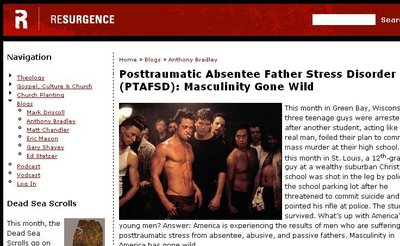 Nancy Murphy
Nancy Murphy teaches at Fuller. I don't know much about her, but I wanted to at least bring this issue to light. Perhaps one of you would like to read her and report back to us. A couple of quotes:
we are our bodies -- there is no additional metaphysical element such as a mind or soul or spirit."
complex physical organisms, imbued with the legacy of thousands of years of culture, and, most importantly, blown by the Breath of God's Spirit; we are Spirited bodies."
As reported in
Nine Marks, this is a quick synopsis to what she's saying.
She is a proponent of a theory called nonreductive physicalism. She notes what her view denies: "First, physicalism is a denial of dualism. Second, the nonreductive part is the denial of the supposition that physicalism also entails the absence of human meaning, responsibility and freedom." Then she explains her theory:
What do nonreductive physicalists believe about human nature? For starters, let me put it this way: For dualists, the concept of the soul serves the purpose of explaining what we might call humans' higher capacities. These include a kind of rationality that goes beyond that of animals, as well as morality and a relationship with God. A reductive view would say that, if there is no soul, then people must not be truly rational, moral or religious; that is, what was taken in the past to be rationality, morality and spirituality is really nothing but brain processes. The nonreductive physicalist says instead that if there is no soul, then these higher capacities must be explained in a different manner. In part they are explainable as brain functions, but their full explanation requires attention to human social relations, to cultural factors and, most importantly, to God's action in our lives ("Nonreductive Physicalism," in Joel B. Green and Stuart L. Palmer, eds., In Search of the Soul: Four Views of the Mind-Body Problem, 115-16)
While this may seem to fly in the face of traditional interpretations of the Biblical teaching of multipartite man (with good reason), Murphy explains herself in this way (from Lynne Rudder Baker's review of Murphy's book,
Bodies and Souls, or Spirited Bodies?:
In Chapter One, Murphy convincingly shows that there is no such thing as "the" anthropology of the Bible or of the Christian tradition. Murphy argues that the fact that the Bible seems to teach dualism is largely a result of poor translations. Once the translations are repaired, "it is hard to find any clear teaching on the metaphysical make-up of the person" in the Bible at all. (p. 37) The Biblical authors were "interested in the various dimensions of human life, in relationships, not in the philosophical question of how many parts are essential components of a human being." (p. 39) Thus, the door is open to physicalism.
All this to say, anthropology is important. We need to be aware that even those within Christendom are advocating physicalism. While Murphy denies the reductive view, many within our churches affirm it without even realizing it, thus destroying their capability to change. Victims, not victors... Other doctrines fall as well, sin for instance. The late O.H. Mowrer (a secular psychologist) puts the problem this way:
For several decades, we psychologists have looked upon the whole matter of sin and moral accountability as a great incubus and acclaimed our liberation from sin as epoch making. But at length we have discovered that to be free from sin, that is to have the excuse of being sick rather than being sinful is to court the danger of also becoming lost. This danger is, I believe, betokened by the widespread interest in existentialism which we are presently witnessing. In becoming amoral, ethically neutral and free, we have cut the very roots of our being, lost our deepest sense of selfhood and identity, and with neurotics themselves, we find ourselves asking, Who am I? What is my deepest destiny? What does living really mean?"
-O. H. Mowrer, former president of the American Psychological Association. (Committed suicide at age 79.)









